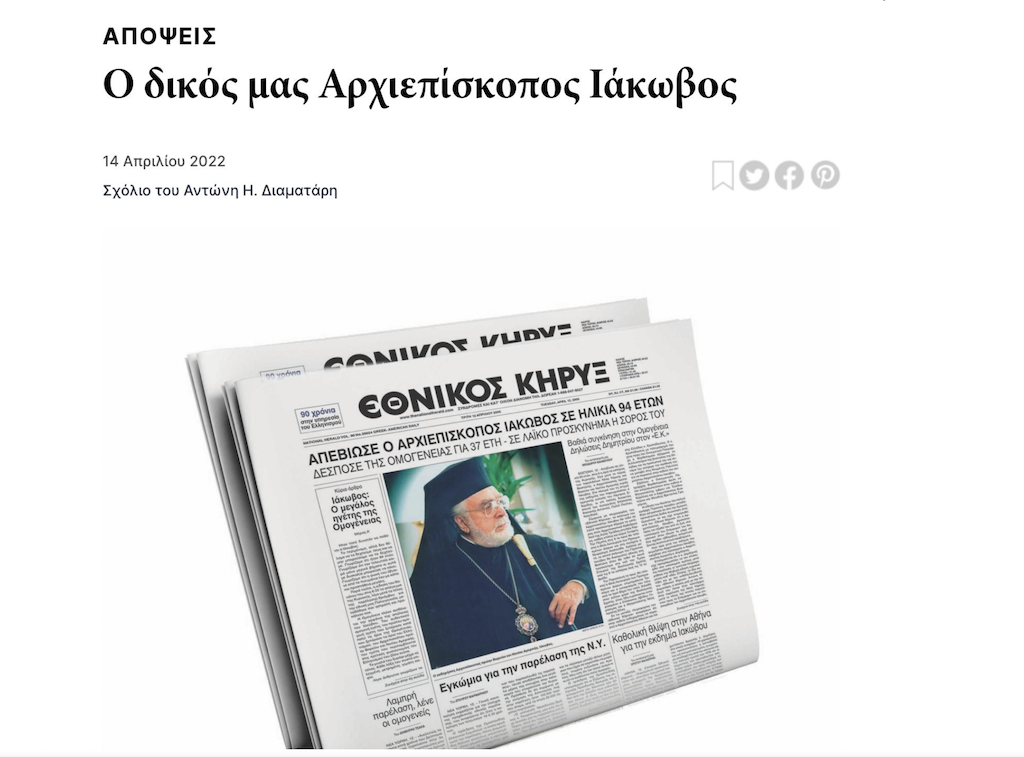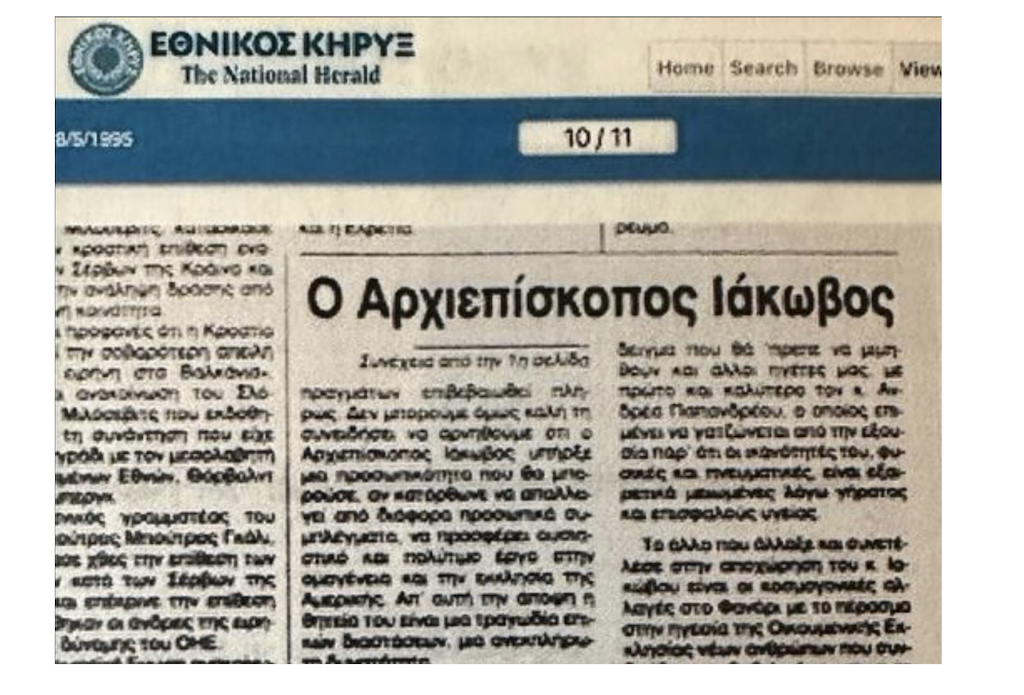By Nikos Kolokythas
The case involving Antonis Diamataris needs thorough examination. As the publisher of the National Herald, his final commendation was directed toward Greek Prime Minister Kyriakos Mitsotakis upon granting him a ministerial position. However, subsequent to these commendations, his stance shifted, even concerning the Prime Minister Kyriakos Mitsotakis who had appointed him.
Antonis Diamataris is the former deputy minister of the Greek diaspora, whom the media of the left-wing Greek party Syriza still remembers as the minister who was caught “with the goat on his back” (means that he was caught red handed). This is an expression everyday people in the village of Lemnos say, where he was born and raised as a child. But instead of a… goat he had a master’s degree in his pocket that he claimed to hold but, in reality, did not possess. At least he did not hold this masters degree at the time when he had this information it in his ministerial résumé.
At the Maximos Mansion (the offical seat of the Greek PM) everyone still remembers Antonis Diamataris’ Business Administration master’s degree he supposedly got from Columbia University . He is the publisher who, under the pretext of interest in the Greek community, always says mean things in his articles and his media outlet. Not only he speaks ill of important people among the Greek diaspora but also of ministers and other high-profile figures in several institutions. Lately he also spoke ill of the Greek Consul in New York.
He billed his resentment as an “opinion” for the sake of Hellenism and the Greek Diaspora. I guess that, since Mr. Diamataris has an opinion on every topic and person, others have the right to experess their opinion on him too. So, let’s examnine the case of this particular person, by examnining his own articles and opinions he puts forward through the National Herald.
Diamataris v. Greek Consul
Just the day before yesterday (13/12/2023) Antonis Diamataris criticized the Greek Consul General. Because he hosts (!) more art exhibitions than its predecessors and “receives many complaints” (sic), as at the last exhibition the Greek flag was used as an art inspiration. So, according to Mr. Diamataris, no artist can experiment with the Greek flag. Nor one can use it as an expression of art.
However, you can experiment a little with your resume as a minister (see main photo). Because the CV of Deputy Minister Antonis Diamataris in 2019 reminded me of Jackson Pollock’s abstract expressionism. It’s nice talking a little bit in terms of art.
So, the former deputy minister criticizes the Greek consul, the institutional person, in order to send him on a decent path. The exhibition, by the way, which is supported by the Greek consulate, gives voice and space of expression to women living in New York highlighting and promoting their diversity and talent. But this seems to be the fine print no one reads for Mr. Diamataris.
Art for him is probably traditonal Greek dishes in Mandela’s tavern in Sardes, Lemnos (the island he comes from).

Diamataris v. Greek government
Since Mr. Diamataris “resigned” from the government, due to the absence of his master’s degree, he doesn’t speak very highly of its members. It’s not just the Greek Consul. In the National Herald on 16.12.2023 they wrote an article against the former Greek Foreign Minister, Nikos Dendias, calling him “the Dauphin of the New Democracy party who is often” politically related to “Samaras and Karamanlis” (former Greek PMs from the New Democracy party).
There are multiple examples. On 15.12.2023 the National Herald implies that Foreign Minister Giorgos Gerapetritis is only the figurehead of the ministry, as he states that “… Ms. Papadopoulou is essentially” in charge of the Ministry of Foreign Affairs”.
Diamataris v. Ecumenical Patriarchate
In stark contrast to the positions of the USA, the Greek government, and the Ecumenical Patriarchate, in the same article (15.12.2023), the apparently ignorant author – who boasts that he was a press consultant in institutional positions of the Greek state – states that the Church of Ukraine “broke away from Moscow”. In other words, the Ecumenical Patriarch had no right to recognize the autocephalous Church of Ukraine and the Church appears to have been stolen (like the Parthenon marbles that were stolen by Lord Elgin) by the Patriarchate of Moscow.
Diamataris v… Diamataris
The most boring, of course, pattern of Antonis Diamataris is his interest in the Archbishops of America. His articles, when referring to the Archbishops, remind me of the story of Dr. Jekyll and Mr. Hyde. One day he praises them and the other day he criticizes them. For example, one day he praised and another day he criticized Archbishop Iakovos of America.
In May 1995, Antonis Diamataris wrote an article in the National Herald about Archbishop Iakovos: “The Archbishop of America could, if he managed to get rid of various personal complexes, offer substantial and valuable work to the Greek community and the Church of America. In this respect, his tenure can be considered as a big Greek tragedy and as an unfulfilled vision.” What a journalistic pattern! Today we praise him, tomorrow we criticize him.

But as you know, as the years go by, one may hope that people will forget what they have written. Antonis Diamataris, following late Archbishop Iakovos’ falling asleep in the Lord, tried to restore his reputation. After crucifying him first, he thought of restoring his reputation in a poetic style. So he writes on April 14, 2022, with his moving article entitled “Our Archbishop Iakovos”: “The Archdiocese of America continues to live thanks to the wind that Iakovos had blown in its sails”, adding – to move the reader even further – that “Iakovos left a gap that unfortunately has not yet been filled”.

Antonis Diamataris concludes in his article by saying that “we all recognized that Iakovos was the actual leader of the Greek Diaspora. No one is irreplaceable. But some leaders are easier to replace than others.”
A useful course at the Columbia University
Can Antonis Diamataris be interpreted? The former deputy minister from the island of Lemnos and current publisher? This Robin Hood of the Greek diaspora? It’s hard to tell. I suggest that those who want to examnine the case should attend the Lecture Course at Columbia University (no. UN2620) by E. McCaskill’ under the title “Abnormal Behavior”. This course gives 3 academic points for the degree and a certificate of studies.
Anyone who attends it can perhaps better interpret the publishing behavior of Antonis Diamataris and run for Deputy Minister of Foreign Affairs in Greece. But this time with a real degree.
*Carte Blanche Project is a pilot artist showcase program conceived and presented by the Consulate General of Greece in NY in collaboration with the advisory arts committee comprised of Eirini Linardaki, Natasha Katerinopoulos, Lolita Koutoudi, and Panos Tsagaris. This program is made possible with major support provided by the Hellenic-American Chamber of Commerce.
The project aims to showcase the work of artists from Greece who live and/or work in New York. This is the first step of a developing initiative to boost their representation and presence in NYC by having bi-monthly art exhibitions hosted at the Consulate General of Greece in NYC.
Moreover, to recognize the plethora of Greek arts professionals in NYC, the arts committee will rotate annually for the various diverse voices of the community to be demonstrated and experienced by local audiences.
Georgia Lale is a visual artist and cancer fighter based in Brooklyn. Their work has been featured in art festivals such as Art in Odd Places (NYC), Venice International Performance Art Week (Italy), and the Brussels Nuit Blanche Festival (Belgium).
Lale’s work has recently been exhibited at A.I.R. Gallery, Border Project Space, Collar Works, Smack Mellon, and Shiva Gallery – among others. They have been invited to discuss their practice by the Dedalus Foundation, MoMA, and Yale University. Their #OrangeVest performance was presented at the Greek Pavilion of the 15th Venice Biennale of Architecture in 2016.
Article translated by: Konstantinos Menyktas















